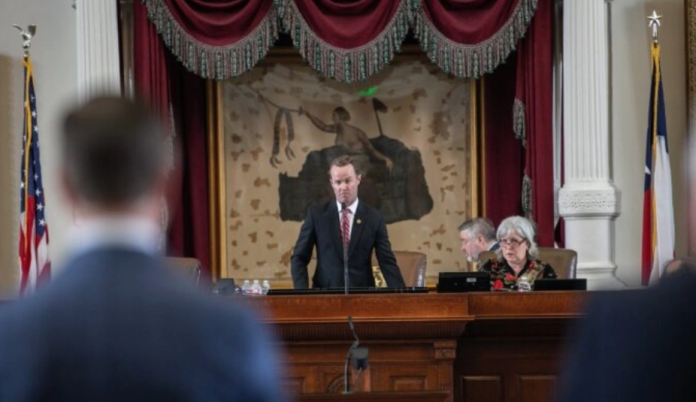The Texas showdown between conservative Republicans and more moderate party members who want to work with Democrats will be determined on Jan. 14 when the state House of Representatives votes on a new speaker.
Rep. David Cook and his challenger in the race, fellow Republican Rep. Dustin Burrows, have been in a stalemate after a majority of Republican lawmakers voted in favor of Cook for speaker at a December meeting.
Burrows was among 26 Republicans who didn’t agree with the vote and left the meeting. The same day, Burrows announced that he had secured the bipartisan support of 38 Democrats and 38 Republicans in the 150-member chamber and declared himself the winner.
Cook and his allies then disputed that Burrows had won.
There are 88 Republicans and 62 Democratic lawmakers in the Texas House. A majority of votes, 76, is needed to become speaker.
The race represents a battle between the party’s more conservative wing and moderates wanting to work with Democrats.
The conservative wing consists of many grassroots Republicans in rural areas and the state’s top Republicans including Gov. Greg Abbott, Lt. Gov. Dan Paxton, and Attorney General Ken Paxton—all supporters of President-elect Donald Trump’s “Make America Great Again” agenda.
The Texas speaker is arguably the third most powerful position in state government. Whoever holds the gavel has the power to influence which bills are brought to a vote.
Some Republicans fear speakers elected mainly by Democrats and a handful of Republicans could compromise the state’s conservative agenda. Dade Phalen, who was the Republican speaker during the last legislative session, won the gavel with support from Democrats. In turn, he appointed several Democrats to positions of power as committee chairs.
Some Republicans say that key pieces of conservative legislation have been thwarted by giving Democrats chairmanship power.
The Republican caucus called on Burrows to quit the race since he did not receive the majority of Republican votes.
According to state GOP rules, all of the 88 Republicans must support the GOP member with the most caucus votes for speaker—which was Cook.
Over the past month, the ongoing civil war within the Republican party set off a flurry of social media posts from state lawmakers and others including Donald Trump Jr., with some calling for the GOP to censure lawmakers who don’t comply with the rules.
The Texas GOP recently aired ads against Burrows in his hometown of Lubbock, issuing a Dec. 12 warning on X that it was time for Burrows to step aside and support Cook.
“Any lawmaker conspiring with Democrats to undermine our party is unacceptable. The @TexasGOP will always work to defend the Republican brand and integrity of our party. This ad is only the beginning,” the post stated.
The latest salvo occurred on Jan. 8 with a complaint filed by Republican Rep. Cody Harris, a Burrows supporter, with the Texas Ethics Commission against state GOP Chairman Abraham George.
The complaint accused George of violating ethics rules by threatening to send out negative mailers or censure lawmakers who support Burrows for the gavel.
Several Republicans favoring Burrows also supported outgoing speaker Phelan, who chose not to seek the leadership position again after narrowly winning his seat in a primary challenge from David Covey in 2024.
The intense race drew attention from outside the Lone Star State, prompting Trump to endorse Phelan’s opponent.
“By stepping aside, I believe we create the best opportunity for our members to rally around a new candidate who will uphold the principles that make our House one of the most exceptional, deliberative legislative bodies in the country—a place where honor, integrity, and the right of every member to vote their district takes utmost precedent,” Phelan said in a statement in December.
While the Republican-led House voted to impeach the attorney general, the Senate, which was also controlled by Republicans, acquitted Paxton in September 2023.
Patrick, who presides over the Senate, criticized Phelan at the end of the trial, calling the process rushed and flawed.
“The speaker and his team rammed through the first impeachment of a statewide official in Texas in over 100 years while paying no attention to the precedent that the House set in every other impeachment before,” Patrick said.
Complaints from Texas grassroots Republicans began to grow in 2023 as Phelan awarded chairmanships to minority party members that hindered passage of key platform measures such as school choice.






















